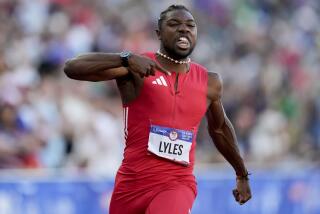Lagat Enjoys Life in Fast Lane
- Share via
Bernard Lagat is a master at running fast in big races.
It’s winning that has proved elusive for the 27-year-old Kenyan, who has yet to win a major race on the international level or European circuit.
Lagat, who is favored to win the men’s mile for the fourth consecutive time in the L.A. Invitational indoor track and field meet at the Sports Arena today, became the second-fastest 1,500-meter runner in history last August when he ran 3 minutes 26.34 seconds at the Van Damme Memorial in Brussels.
Lagat has broken 3:32 in the 1,500--equivalent to a 3:49 mile--on 11 occasions the past three seasons, but the 2000 Olympic bronze medalist in the 1,500 placed second or third in each of those races.
“Right now, he’s probably the master at finishing second in extremely fast times,” said James Li, Lagat’s coach for the past 51/2 years. “But he probably needs to be a more diverse athlete who can deal with a variety of races.”
This is not to knock Lagat.
The Washington State graduate was the silver medalist in the 1,500 in the world championships in Edmonton, Canada, last summer and was ranked fourth in the world in 1999, third in 2000 and second last year. But he has been overshadowed by countryman Noah Ngeny and Moroccan Hicham El Guerrouj.
“When you say, ‘Noah’ in Europe, people say, ‘Ooooooh. That is the Olympic champion,’” said the friendly, easy-going Lagat. “Or when you mention El Guerrouj, they say, ‘He’s the world record-holder or the world champion.’”
Lagat lacks those titles, but the resident of Pullman, Wash., appears capable of attaining them in the next few years.
His best in the 1,500 is only .34 seconds off the world record set by three-time world champion El Guerrouj in 1998, and he has improved steadily since running 3:34.48 that year.
“He is such a late bloomer and relatively inexperienced when it comes to racing at the highest level,” said Li, the cross-country coach at Washington State. “So there is still a lot of room for improvement.”
Li began working with Lagat in the fall of 1996 when Lagat enrolled at Washington State on an athletic scholarship, but it took a year for them to produce noteworthy results.
Lagat, known as Kip to those around him, was sidelined because of a tendon injury in his left knee for much of the 1996 cross-country season and his best of 3:41.19 in the 1,500 during the 1997 track season was well off the 3:37.7 he ran in 1996.
“I think it took us a year to get to know each other,” Li said.
“It took a year for me to find out what he responded to best and for him to understand what I expected of him.”
After his first-year struggles at Washington State, Lagat placed third in the 1997 NCAA cross-country championships.
He placed second in the 3,000 and anchored the Cougars’ distance medley relay team to a world-best time in the 1998 NCAA indoor championships before finishing eighth in the 1,500 in the outdoor meet after he was inadvertently tripped late in the race.
The disappointment of that race eased later that summer when he ran 3:34.48 to finish sixth in a meet in Stuttgart, Germany.
“I can’t tell you how hard it was,” Lagat said with a laugh. “During the race, I couldn’t even breathe because the guys were running so fast.... The last 100 [meters] seemed like it was 400.”
Lagat’s performance ranked him 26th on the 1998 world list and made him realize that he had to make some changes if he wanted to become one of the world’s elite.
First, he needed to alter his running mechanics.
His long, flowing stride was beautiful to watch, but a shorter stride with a quicker turnover was required to excel in the fast-paced 1,500.
Second, he needed to work on his mental preparation for running against 1,500 and mile titans such as El Guerrouj and Noureddine Morceli of Algeria.
“I had a tendency to be in awe of them because they were so fast,” Lagat said.
Lagat won a combined three NCAA titles during the 1999 indoor and outdoor track seasons. But he wasn’t considered among the top 1,500 runners in the world until August of that year when he ran 3:30.61 and 3:30.56 in consecutive races in Europe.
Those performances were nearly four seconds faster than his previous best and gave him his first victories against 1996 Olympic champion Morceli.
“Monaco was a big meet for me because I beat Morceli for the first time and broke 3:31 for the first time,” he said.
Lagat got an equally big thrill a week later in Zurich when Morceli approached him before his 3:30.56 clocking and told him that he had a “very, very good future.”
Morceli, the top-ranked 1,500 and mile runner in the world from 1990-96, knew what he was talking about.
Lagat lowered his 1,500 best to 3:28.51 in 2000--after giving up his final year of collegiate eligibility so he could run professionally--and to 3:26.34 last year.
Lagat has run the two fastest indoor mile times of his career this year at 3:55.07 and 3:55.16.
*
(BEGIN TEXT OF INFOBOX)
At a Glance
What: L.A. Invitational indoor track and field meet.
Where: Sports Arena.
When: Today. The boys’ and girls’ shotput and discus will be held at USC, starting at 9 a.m. The rest of the high school events will be held at the Sports Arena, starting at 10:30 a.m. Open events will begin with the women’s pole vault at 4:40 p.m.
More to Read
Go beyond the scoreboard
Get the latest on L.A.'s teams in the daily Sports Report newsletter.
You may occasionally receive promotional content from the Los Angeles Times.






